An Analysis of Brexit's Impact on UK Public Company M&A in the EU
VerifiedAdded on 2020/06/04
|29
|9787
|138
Report
AI Summary
This report investigates the impact of Brexit on the merger and acquisition (M&A) activities of public companies in the UK, focusing on their operational presence in the European Union. The study explores the economic and legal implications of Brexit, including its effects on trade, investment, and the value of the pound. The research examines whether Brexit will be beneficial for firms seeking M&A deals within the EU and analyzes the challenges faced by UK companies in maintaining access to European markets. The report delves into the impact on GDP, per capita income, and inward investment, considering the legal and commercial impacts on M&A. The methodology includes secondary data analysis from articles, books, and journals to assess how Brexit affects the UK's economic landscape and the strategic decisions of public companies regarding their operations and market access within the EU.

UK leaving the
EU
EU
Paraphrase This Document
Need a fresh take? Get an instant paraphrase of this document with our AI Paraphraser
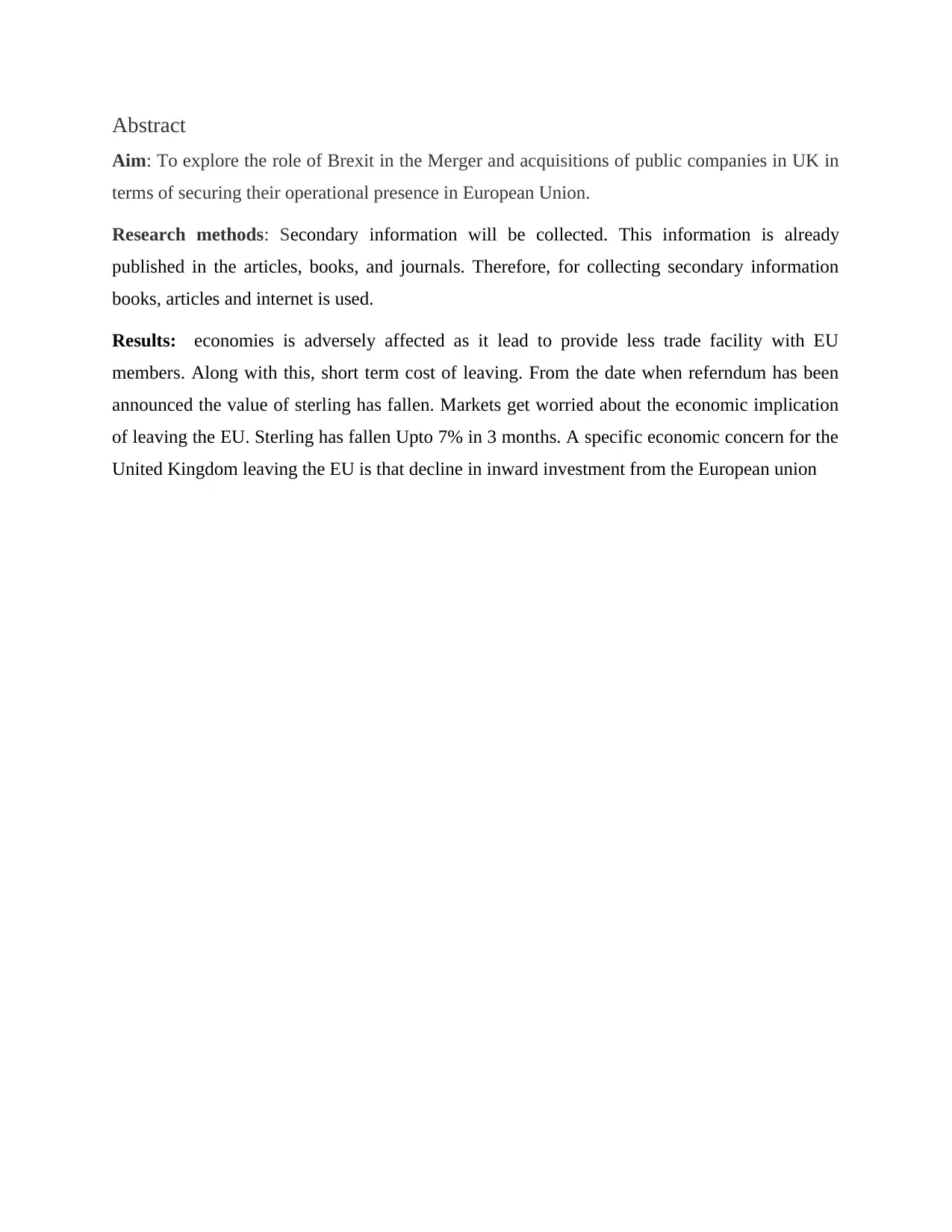
Abstract
Aim: To explore the role of Brexit in the Merger and acquisitions of public companies in UK in
terms of securing their operational presence in European Union.
Research methods: Secondary information will be collected. This information is already
published in the articles, books, and journals. Therefore, for collecting secondary information
books, articles and internet is used.
Results: economies is adversely affected as it lead to provide less trade facility with EU
members. Along with this, short term cost of leaving. From the date when referndum has been
announced the value of sterling has fallen. Markets get worried about the economic implication
of leaving the EU. Sterling has fallen Upto 7% in 3 months. A specific economic concern for the
United Kingdom leaving the EU is that decline in inward investment from the European union
Aim: To explore the role of Brexit in the Merger and acquisitions of public companies in UK in
terms of securing their operational presence in European Union.
Research methods: Secondary information will be collected. This information is already
published in the articles, books, and journals. Therefore, for collecting secondary information
books, articles and internet is used.
Results: economies is adversely affected as it lead to provide less trade facility with EU
members. Along with this, short term cost of leaving. From the date when referndum has been
announced the value of sterling has fallen. Markets get worried about the economic implication
of leaving the EU. Sterling has fallen Upto 7% in 3 months. A specific economic concern for the
United Kingdom leaving the EU is that decline in inward investment from the European union
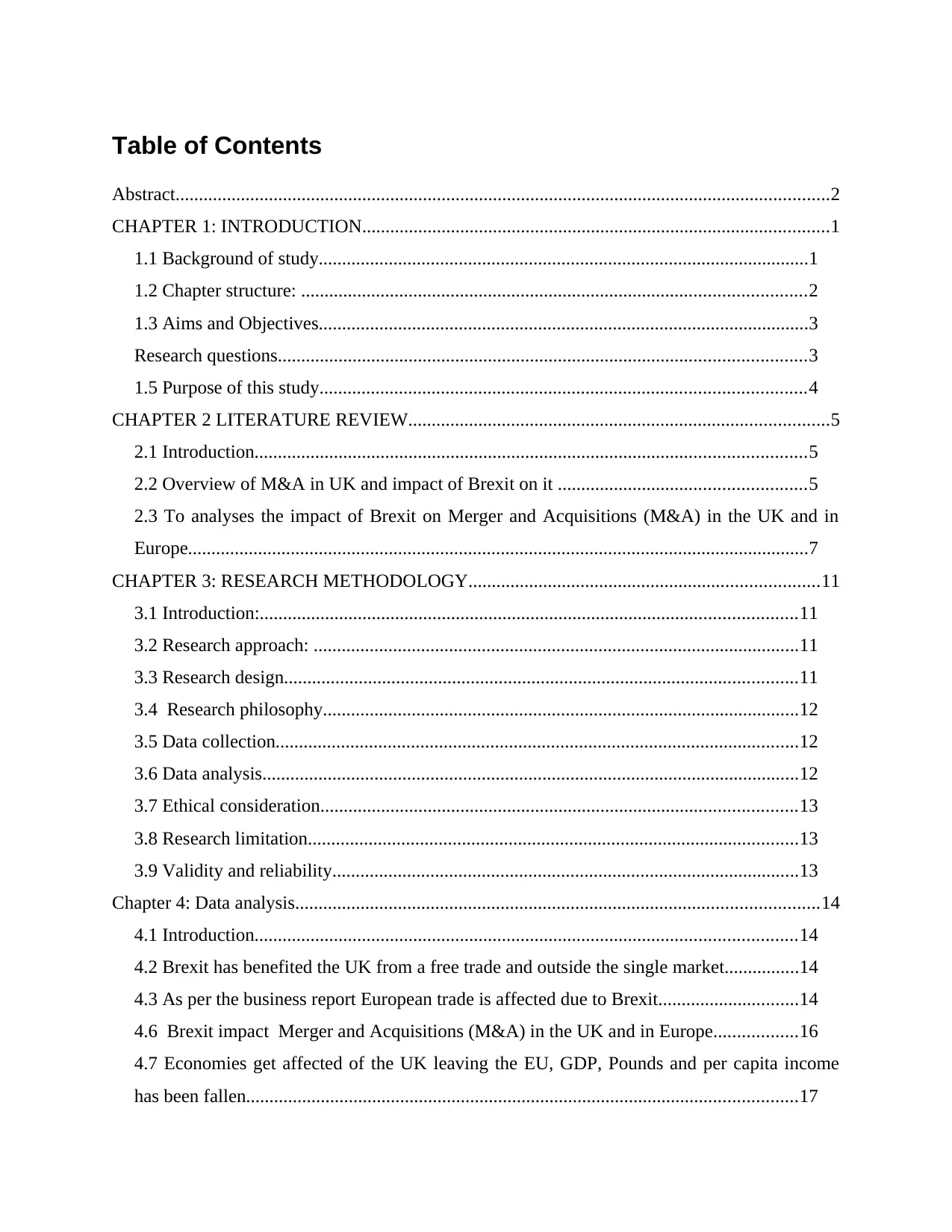
Table of Contents
Abstract............................................................................................................................................2
CHAPTER 1: INTRODUCTION....................................................................................................1
1.1 Background of study.........................................................................................................1
1.2 Chapter structure: ............................................................................................................2
1.3 Aims and Objectives.........................................................................................................3
Research questions.................................................................................................................3
1.5 Purpose of this study........................................................................................................4
CHAPTER 2 LITERATURE REVIEW..........................................................................................5
2.1 Introduction......................................................................................................................5
2.2 Overview of M&A in UK and impact of Brexit on it .....................................................5
2.3 To analyses the impact of Brexit on Merger and Acquisitions (M&A) in the UK and in
Europe.....................................................................................................................................7
CHAPTER 3: RESEARCH METHODOLOGY...........................................................................11
3.1 Introduction:...................................................................................................................11
3.2 Research approach: ........................................................................................................11
3.3 Research design..............................................................................................................11
3.4 Research philosophy......................................................................................................12
3.5 Data collection................................................................................................................12
3.6 Data analysis...................................................................................................................12
3.7 Ethical consideration......................................................................................................13
3.8 Research limitation.........................................................................................................13
3.9 Validity and reliability....................................................................................................13
Chapter 4: Data analysis................................................................................................................14
4.1 Introduction....................................................................................................................14
4.2 Brexit has benefited the UK from a free trade and outside the single market................14
4.3 As per the business report European trade is affected due to Brexit..............................14
4.6 Brexit impact Merger and Acquisitions (M&A) in the UK and in Europe..................16
4.7 Economies get affected of the UK leaving the EU, GDP, Pounds and per capita income
has been fallen......................................................................................................................17
Abstract............................................................................................................................................2
CHAPTER 1: INTRODUCTION....................................................................................................1
1.1 Background of study.........................................................................................................1
1.2 Chapter structure: ............................................................................................................2
1.3 Aims and Objectives.........................................................................................................3
Research questions.................................................................................................................3
1.5 Purpose of this study........................................................................................................4
CHAPTER 2 LITERATURE REVIEW..........................................................................................5
2.1 Introduction......................................................................................................................5
2.2 Overview of M&A in UK and impact of Brexit on it .....................................................5
2.3 To analyses the impact of Brexit on Merger and Acquisitions (M&A) in the UK and in
Europe.....................................................................................................................................7
CHAPTER 3: RESEARCH METHODOLOGY...........................................................................11
3.1 Introduction:...................................................................................................................11
3.2 Research approach: ........................................................................................................11
3.3 Research design..............................................................................................................11
3.4 Research philosophy......................................................................................................12
3.5 Data collection................................................................................................................12
3.6 Data analysis...................................................................................................................12
3.7 Ethical consideration......................................................................................................13
3.8 Research limitation.........................................................................................................13
3.9 Validity and reliability....................................................................................................13
Chapter 4: Data analysis................................................................................................................14
4.1 Introduction....................................................................................................................14
4.2 Brexit has benefited the UK from a free trade and outside the single market................14
4.3 As per the business report European trade is affected due to Brexit..............................14
4.6 Brexit impact Merger and Acquisitions (M&A) in the UK and in Europe..................16
4.7 Economies get affected of the UK leaving the EU, GDP, Pounds and per capita income
has been fallen......................................................................................................................17
⊘ This is a preview!⊘
Do you want full access?
Subscribe today to unlock all pages.

Trusted by 1+ million students worldwide
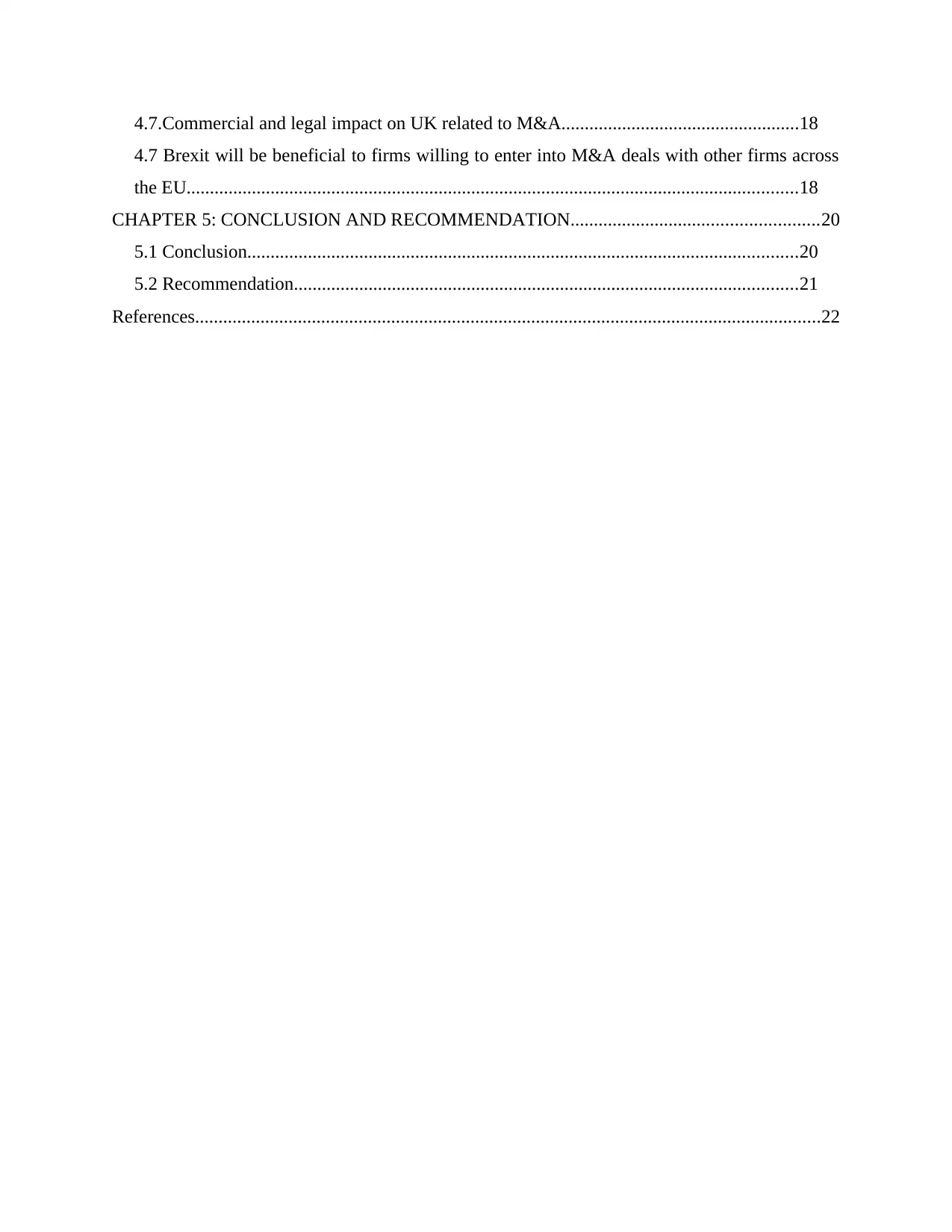
4.7.Commercial and legal impact on UK related to M&A...................................................18
4.7 Brexit will be beneficial to firms willing to enter into M&A deals with other firms across
the EU...................................................................................................................................18
CHAPTER 5: CONCLUSION AND RECOMMENDATION.....................................................20
5.1 Conclusion......................................................................................................................20
5.2 Recommendation............................................................................................................21
References......................................................................................................................................22
4.7 Brexit will be beneficial to firms willing to enter into M&A deals with other firms across
the EU...................................................................................................................................18
CHAPTER 5: CONCLUSION AND RECOMMENDATION.....................................................20
5.1 Conclusion......................................................................................................................20
5.2 Recommendation............................................................................................................21
References......................................................................................................................................22
Paraphrase This Document
Need a fresh take? Get an instant paraphrase of this document with our AI Paraphraser
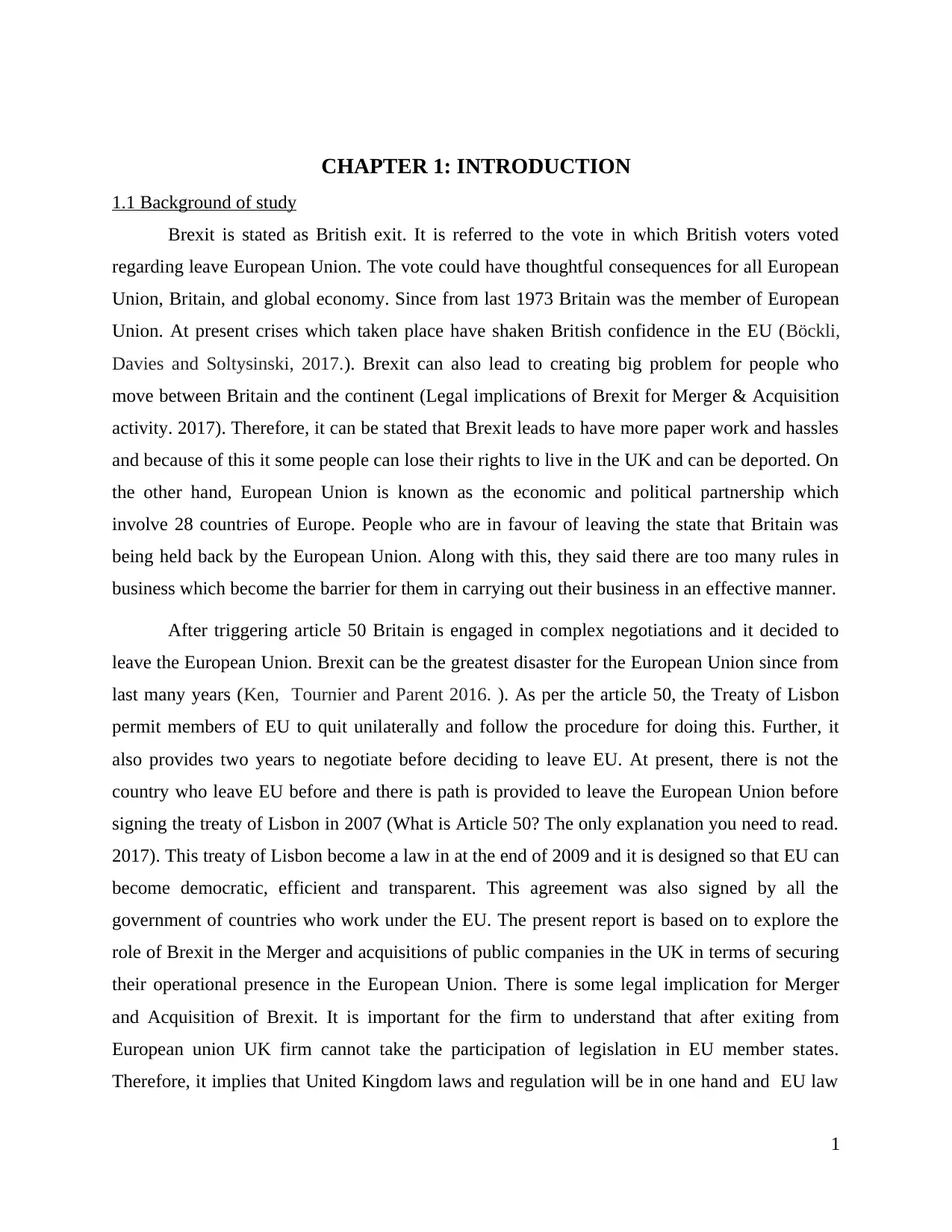
CHAPTER 1: INTRODUCTION
1.1 Background of study
Brexit is stated as British exit. It is referred to the vote in which British voters voted
regarding leave European Union. The vote could have thoughtful consequences for all European
Union, Britain, and global economy. Since from last 1973 Britain was the member of European
Union. At present crises which taken place have shaken British confidence in the EU (Böckli,
Davies and Soltysinski, 2017.). Brexit can also lead to creating big problem for people who
move between Britain and the continent (Legal implications of Brexit for Merger & Acquisition
activity. 2017). Therefore, it can be stated that Brexit leads to have more paper work and hassles
and because of this it some people can lose their rights to live in the UK and can be deported. On
the other hand, European Union is known as the economic and political partnership which
involve 28 countries of Europe. People who are in favour of leaving the state that Britain was
being held back by the European Union. Along with this, they said there are too many rules in
business which become the barrier for them in carrying out their business in an effective manner.
After triggering article 50 Britain is engaged in complex negotiations and it decided to
leave the European Union. Brexit can be the greatest disaster for the European Union since from
last many years (Ken, Tournier and Parent 2016. ). As per the article 50, the Treaty of Lisbon
permit members of EU to quit unilaterally and follow the procedure for doing this. Further, it
also provides two years to negotiate before deciding to leave EU. At present, there is not the
country who leave EU before and there is path is provided to leave the European Union before
signing the treaty of Lisbon in 2007 (What is Article 50? The only explanation you need to read.
2017). This treaty of Lisbon become a law in at the end of 2009 and it is designed so that EU can
become democratic, efficient and transparent. This agreement was also signed by all the
government of countries who work under the EU. The present report is based on to explore the
role of Brexit in the Merger and acquisitions of public companies in the UK in terms of securing
their operational presence in the European Union. There is some legal implication for Merger
and Acquisition of Brexit. It is important for the firm to understand that after exiting from
European union UK firm cannot take the participation of legislation in EU member states.
Therefore, it implies that United Kingdom laws and regulation will be in one hand and EU law
1
1.1 Background of study
Brexit is stated as British exit. It is referred to the vote in which British voters voted
regarding leave European Union. The vote could have thoughtful consequences for all European
Union, Britain, and global economy. Since from last 1973 Britain was the member of European
Union. At present crises which taken place have shaken British confidence in the EU (Böckli,
Davies and Soltysinski, 2017.). Brexit can also lead to creating big problem for people who
move between Britain and the continent (Legal implications of Brexit for Merger & Acquisition
activity. 2017). Therefore, it can be stated that Brexit leads to have more paper work and hassles
and because of this it some people can lose their rights to live in the UK and can be deported. On
the other hand, European Union is known as the economic and political partnership which
involve 28 countries of Europe. People who are in favour of leaving the state that Britain was
being held back by the European Union. Along with this, they said there are too many rules in
business which become the barrier for them in carrying out their business in an effective manner.
After triggering article 50 Britain is engaged in complex negotiations and it decided to
leave the European Union. Brexit can be the greatest disaster for the European Union since from
last many years (Ken, Tournier and Parent 2016. ). As per the article 50, the Treaty of Lisbon
permit members of EU to quit unilaterally and follow the procedure for doing this. Further, it
also provides two years to negotiate before deciding to leave EU. At present, there is not the
country who leave EU before and there is path is provided to leave the European Union before
signing the treaty of Lisbon in 2007 (What is Article 50? The only explanation you need to read.
2017). This treaty of Lisbon become a law in at the end of 2009 and it is designed so that EU can
become democratic, efficient and transparent. This agreement was also signed by all the
government of countries who work under the EU. The present report is based on to explore the
role of Brexit in the Merger and acquisitions of public companies in the UK in terms of securing
their operational presence in the European Union. There is some legal implication for Merger
and Acquisition of Brexit. It is important for the firm to understand that after exiting from
European union UK firm cannot take the participation of legislation in EU member states.
Therefore, it implies that United Kingdom laws and regulation will be in one hand and EU law
1
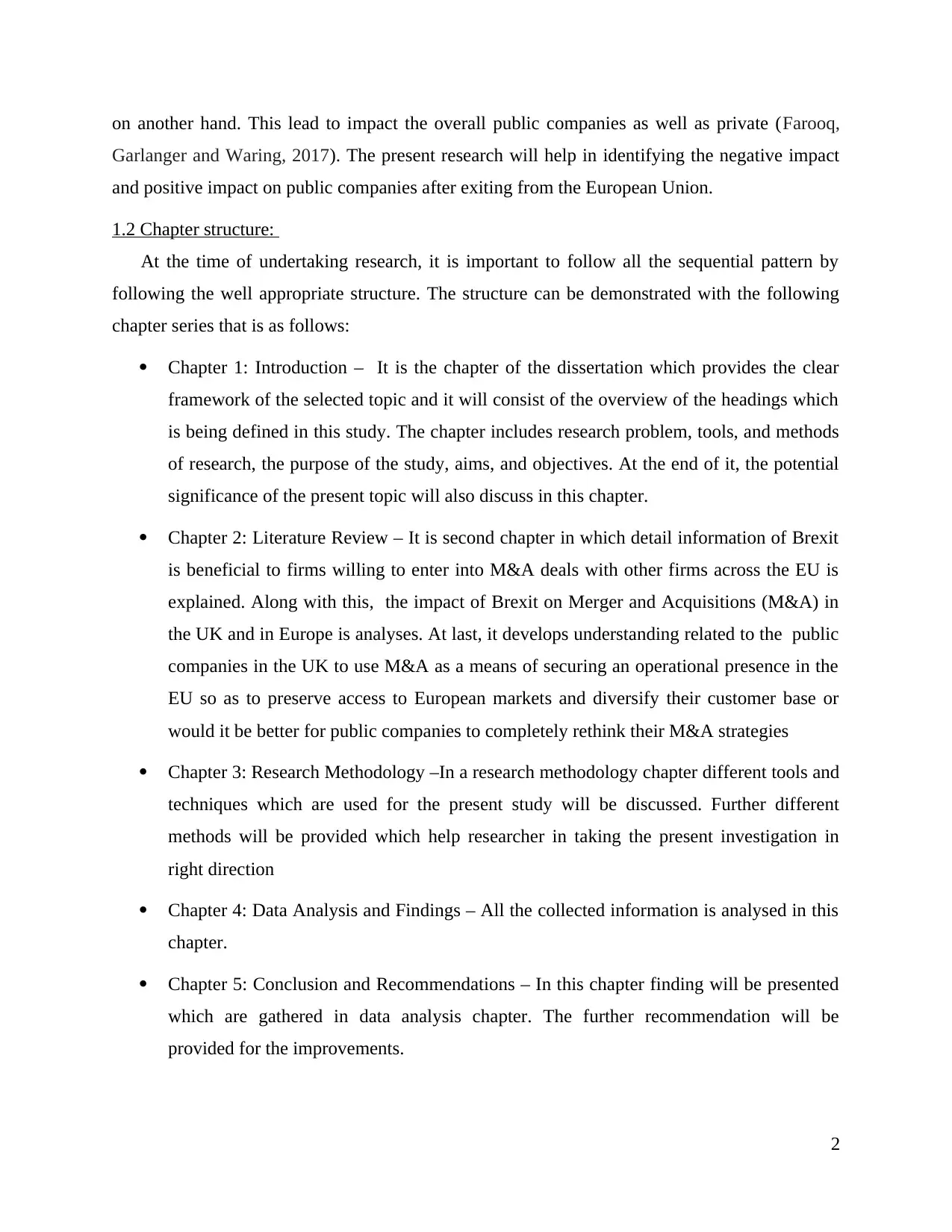
on another hand. This lead to impact the overall public companies as well as private (Farooq,
Garlanger and Waring, 2017). The present research will help in identifying the negative impact
and positive impact on public companies after exiting from the European Union.
1.2 Chapter structure:
At the time of undertaking research, it is important to follow all the sequential pattern by
following the well appropriate structure. The structure can be demonstrated with the following
chapter series that is as follows:
Chapter 1: Introduction – It is the chapter of the dissertation which provides the clear
framework of the selected topic and it will consist of the overview of the headings which
is being defined in this study. The chapter includes research problem, tools, and methods
of research, the purpose of the study, aims, and objectives. At the end of it, the potential
significance of the present topic will also discuss in this chapter.
Chapter 2: Literature Review – It is second chapter in which detail information of Brexit
is beneficial to firms willing to enter into M&A deals with other firms across the EU is
explained. Along with this, the impact of Brexit on Merger and Acquisitions (M&A) in
the UK and in Europe is analyses. At last, it develops understanding related to the public
companies in the UK to use M&A as a means of securing an operational presence in the
EU so as to preserve access to European markets and diversify their customer base or
would it be better for public companies to completely rethink their M&A strategies
Chapter 3: Research Methodology –In a research methodology chapter different tools and
techniques which are used for the present study will be discussed. Further different
methods will be provided which help researcher in taking the present investigation in
right direction
Chapter 4: Data Analysis and Findings – All the collected information is analysed in this
chapter.
Chapter 5: Conclusion and Recommendations – In this chapter finding will be presented
which are gathered in data analysis chapter. The further recommendation will be
provided for the improvements.
2
Garlanger and Waring, 2017). The present research will help in identifying the negative impact
and positive impact on public companies after exiting from the European Union.
1.2 Chapter structure:
At the time of undertaking research, it is important to follow all the sequential pattern by
following the well appropriate structure. The structure can be demonstrated with the following
chapter series that is as follows:
Chapter 1: Introduction – It is the chapter of the dissertation which provides the clear
framework of the selected topic and it will consist of the overview of the headings which
is being defined in this study. The chapter includes research problem, tools, and methods
of research, the purpose of the study, aims, and objectives. At the end of it, the potential
significance of the present topic will also discuss in this chapter.
Chapter 2: Literature Review – It is second chapter in which detail information of Brexit
is beneficial to firms willing to enter into M&A deals with other firms across the EU is
explained. Along with this, the impact of Brexit on Merger and Acquisitions (M&A) in
the UK and in Europe is analyses. At last, it develops understanding related to the public
companies in the UK to use M&A as a means of securing an operational presence in the
EU so as to preserve access to European markets and diversify their customer base or
would it be better for public companies to completely rethink their M&A strategies
Chapter 3: Research Methodology –In a research methodology chapter different tools and
techniques which are used for the present study will be discussed. Further different
methods will be provided which help researcher in taking the present investigation in
right direction
Chapter 4: Data Analysis and Findings – All the collected information is analysed in this
chapter.
Chapter 5: Conclusion and Recommendations – In this chapter finding will be presented
which are gathered in data analysis chapter. The further recommendation will be
provided for the improvements.
2
⊘ This is a preview!⊘
Do you want full access?
Subscribe today to unlock all pages.

Trusted by 1+ million students worldwide
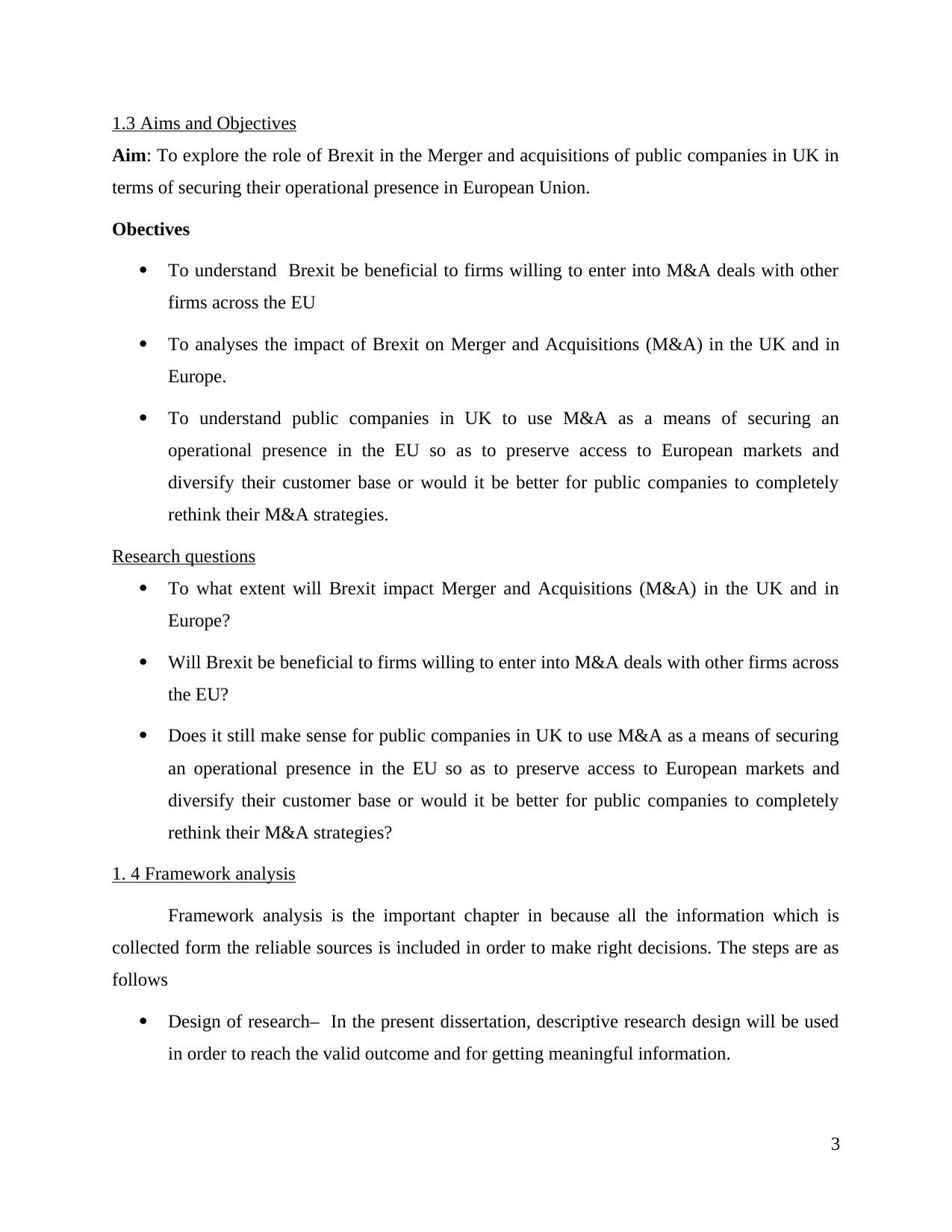
1.3 Aims and Objectives
Aim: To explore the role of Brexit in the Merger and acquisitions of public companies in UK in
terms of securing their operational presence in European Union.
Obectives
To understand Brexit be beneficial to firms willing to enter into M&A deals with other
firms across the EU
To analyses the impact of Brexit on Merger and Acquisitions (M&A) in the UK and in
Europe.
To understand public companies in UK to use M&A as a means of securing an
operational presence in the EU so as to preserve access to European markets and
diversify their customer base or would it be better for public companies to completely
rethink their M&A strategies.
Research questions
To what extent will Brexit impact Merger and Acquisitions (M&A) in the UK and in
Europe?
Will Brexit be beneficial to firms willing to enter into M&A deals with other firms across
the EU?
Does it still make sense for public companies in UK to use M&A as a means of securing
an operational presence in the EU so as to preserve access to European markets and
diversify their customer base or would it be better for public companies to completely
rethink their M&A strategies?
1. 4 Framework analysis
Framework analysis is the important chapter in because all the information which is
collected form the reliable sources is included in order to make right decisions. The steps are as
follows
Design of research– In the present dissertation, descriptive research design will be used
in order to reach the valid outcome and for getting meaningful information.
3
Aim: To explore the role of Brexit in the Merger and acquisitions of public companies in UK in
terms of securing their operational presence in European Union.
Obectives
To understand Brexit be beneficial to firms willing to enter into M&A deals with other
firms across the EU
To analyses the impact of Brexit on Merger and Acquisitions (M&A) in the UK and in
Europe.
To understand public companies in UK to use M&A as a means of securing an
operational presence in the EU so as to preserve access to European markets and
diversify their customer base or would it be better for public companies to completely
rethink their M&A strategies.
Research questions
To what extent will Brexit impact Merger and Acquisitions (M&A) in the UK and in
Europe?
Will Brexit be beneficial to firms willing to enter into M&A deals with other firms across
the EU?
Does it still make sense for public companies in UK to use M&A as a means of securing
an operational presence in the EU so as to preserve access to European markets and
diversify their customer base or would it be better for public companies to completely
rethink their M&A strategies?
1. 4 Framework analysis
Framework analysis is the important chapter in because all the information which is
collected form the reliable sources is included in order to make right decisions. The steps are as
follows
Design of research– In the present dissertation, descriptive research design will be used
in order to reach the valid outcome and for getting meaningful information.
3
Paraphrase This Document
Need a fresh take? Get an instant paraphrase of this document with our AI Paraphraser
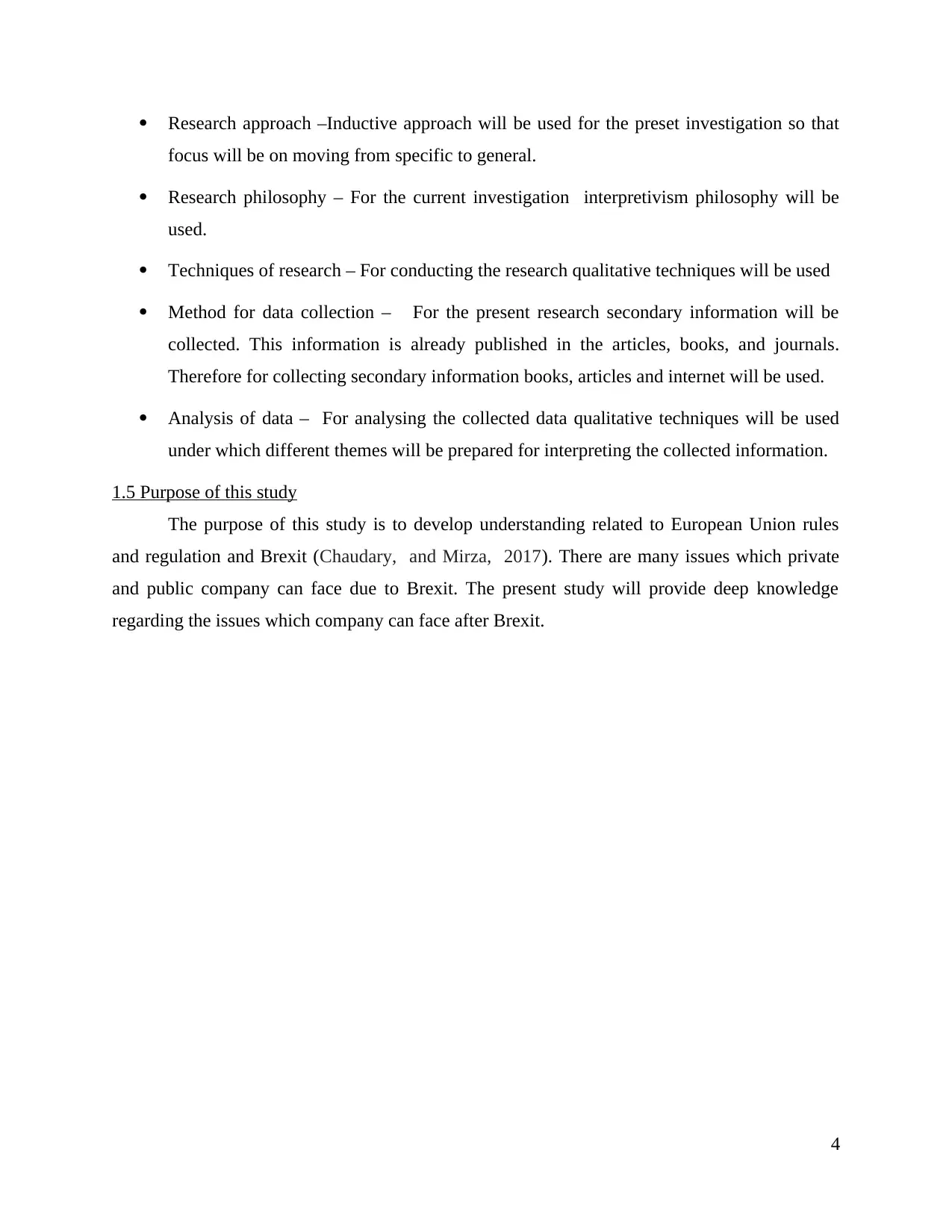
Research approach –Inductive approach will be used for the preset investigation so that
focus will be on moving from specific to general.
Research philosophy – For the current investigation interpretivism philosophy will be
used.
Techniques of research – For conducting the research qualitative techniques will be used
Method for data collection – For the present research secondary information will be
collected. This information is already published in the articles, books, and journals.
Therefore for collecting secondary information books, articles and internet will be used.
Analysis of data – For analysing the collected data qualitative techniques will be used
under which different themes will be prepared for interpreting the collected information.
1.5 Purpose of this study
The purpose of this study is to develop understanding related to European Union rules
and regulation and Brexit (Chaudary, and Mirza, 2017). There are many issues which private
and public company can face due to Brexit. The present study will provide deep knowledge
regarding the issues which company can face after Brexit.
4
focus will be on moving from specific to general.
Research philosophy – For the current investigation interpretivism philosophy will be
used.
Techniques of research – For conducting the research qualitative techniques will be used
Method for data collection – For the present research secondary information will be
collected. This information is already published in the articles, books, and journals.
Therefore for collecting secondary information books, articles and internet will be used.
Analysis of data – For analysing the collected data qualitative techniques will be used
under which different themes will be prepared for interpreting the collected information.
1.5 Purpose of this study
The purpose of this study is to develop understanding related to European Union rules
and regulation and Brexit (Chaudary, and Mirza, 2017). There are many issues which private
and public company can face due to Brexit. The present study will provide deep knowledge
regarding the issues which company can face after Brexit.
4
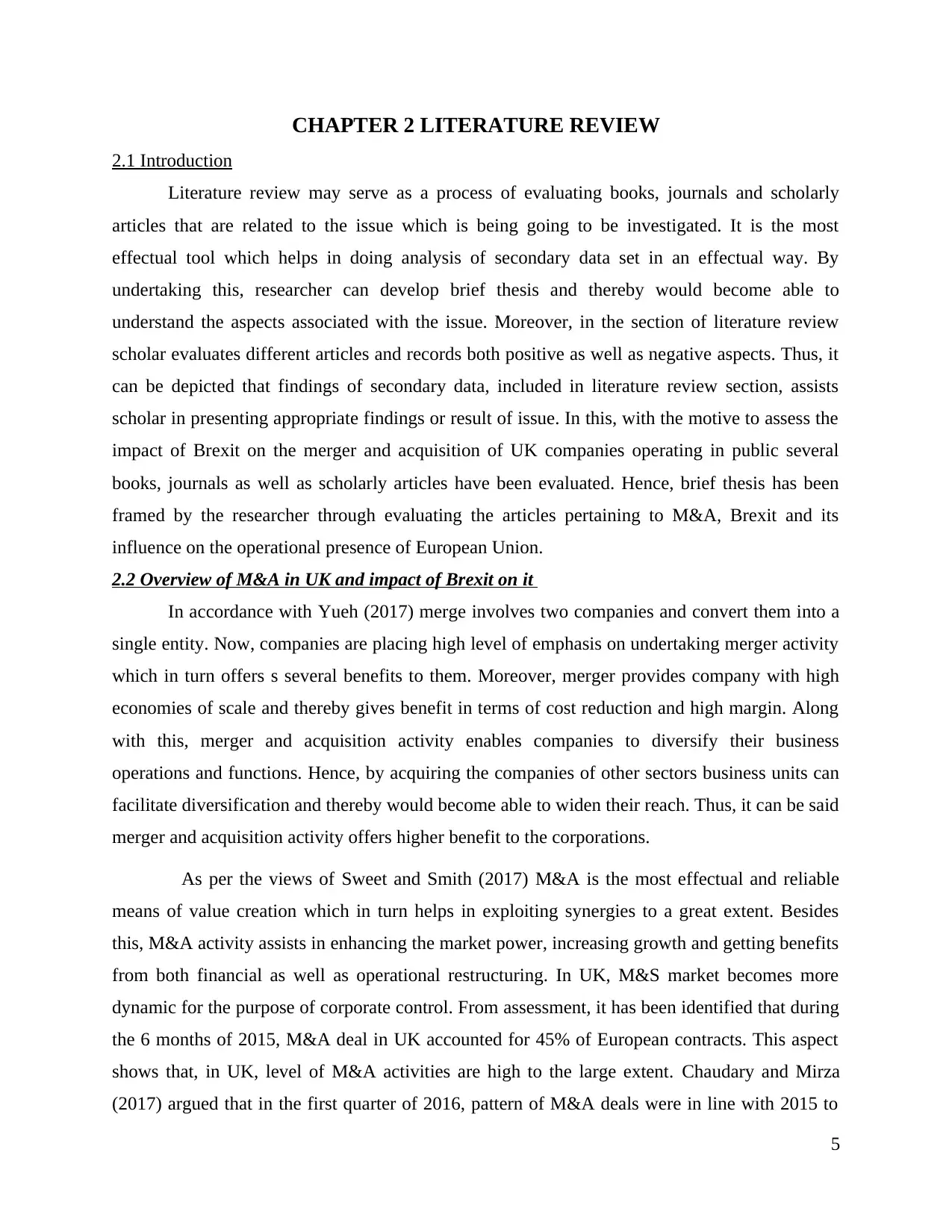
CHAPTER 2 LITERATURE REVIEW
2.1 Introduction
Literature review may serve as a process of evaluating books, journals and scholarly
articles that are related to the issue which is being going to be investigated. It is the most
effectual tool which helps in doing analysis of secondary data set in an effectual way. By
undertaking this, researcher can develop brief thesis and thereby would become able to
understand the aspects associated with the issue. Moreover, in the section of literature review
scholar evaluates different articles and records both positive as well as negative aspects. Thus, it
can be depicted that findings of secondary data, included in literature review section, assists
scholar in presenting appropriate findings or result of issue. In this, with the motive to assess the
impact of Brexit on the merger and acquisition of UK companies operating in public several
books, journals as well as scholarly articles have been evaluated. Hence, brief thesis has been
framed by the researcher through evaluating the articles pertaining to M&A, Brexit and its
influence on the operational presence of European Union.
2.2 Overview of M&A in UK and impact of Brexit on it
In accordance with Yueh (2017) merge involves two companies and convert them into a
single entity. Now, companies are placing high level of emphasis on undertaking merger activity
which in turn offers s several benefits to them. Moreover, merger provides company with high
economies of scale and thereby gives benefit in terms of cost reduction and high margin. Along
with this, merger and acquisition activity enables companies to diversify their business
operations and functions. Hence, by acquiring the companies of other sectors business units can
facilitate diversification and thereby would become able to widen their reach. Thus, it can be said
merger and acquisition activity offers higher benefit to the corporations.
As per the views of Sweet and Smith (2017) M&A is the most effectual and reliable
means of value creation which in turn helps in exploiting synergies to a great extent. Besides
this, M&A activity assists in enhancing the market power, increasing growth and getting benefits
from both financial as well as operational restructuring. In UK, M&S market becomes more
dynamic for the purpose of corporate control. From assessment, it has been identified that during
the 6 months of 2015, M&A deal in UK accounted for 45% of European contracts. This aspect
shows that, in UK, level of M&A activities are high to the large extent. Chaudary and Mirza
(2017) argued that in the first quarter of 2016, pattern of M&A deals were in line with 2015 to
5
2.1 Introduction
Literature review may serve as a process of evaluating books, journals and scholarly
articles that are related to the issue which is being going to be investigated. It is the most
effectual tool which helps in doing analysis of secondary data set in an effectual way. By
undertaking this, researcher can develop brief thesis and thereby would become able to
understand the aspects associated with the issue. Moreover, in the section of literature review
scholar evaluates different articles and records both positive as well as negative aspects. Thus, it
can be depicted that findings of secondary data, included in literature review section, assists
scholar in presenting appropriate findings or result of issue. In this, with the motive to assess the
impact of Brexit on the merger and acquisition of UK companies operating in public several
books, journals as well as scholarly articles have been evaluated. Hence, brief thesis has been
framed by the researcher through evaluating the articles pertaining to M&A, Brexit and its
influence on the operational presence of European Union.
2.2 Overview of M&A in UK and impact of Brexit on it
In accordance with Yueh (2017) merge involves two companies and convert them into a
single entity. Now, companies are placing high level of emphasis on undertaking merger activity
which in turn offers s several benefits to them. Moreover, merger provides company with high
economies of scale and thereby gives benefit in terms of cost reduction and high margin. Along
with this, merger and acquisition activity enables companies to diversify their business
operations and functions. Hence, by acquiring the companies of other sectors business units can
facilitate diversification and thereby would become able to widen their reach. Thus, it can be said
merger and acquisition activity offers higher benefit to the corporations.
As per the views of Sweet and Smith (2017) M&A is the most effectual and reliable
means of value creation which in turn helps in exploiting synergies to a great extent. Besides
this, M&A activity assists in enhancing the market power, increasing growth and getting benefits
from both financial as well as operational restructuring. In UK, M&S market becomes more
dynamic for the purpose of corporate control. From assessment, it has been identified that during
the 6 months of 2015, M&A deal in UK accounted for 45% of European contracts. This aspect
shows that, in UK, level of M&A activities are high to the large extent. Chaudary and Mirza
(2017) argued that in the first quarter of 2016, pattern of M&A deals were in line with 2015 to
5
⊘ This is a preview!⊘
Do you want full access?
Subscribe today to unlock all pages.

Trusted by 1+ million students worldwide
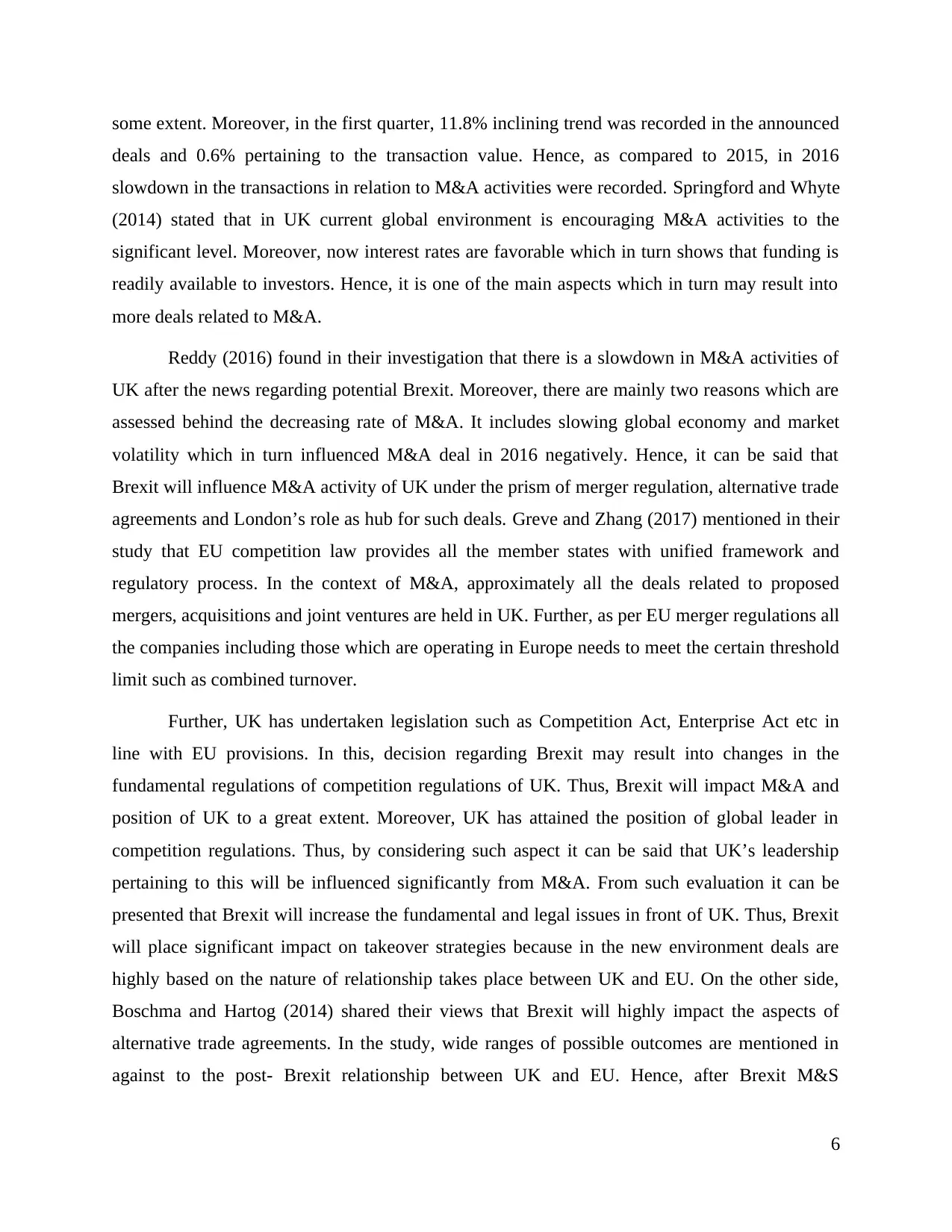
some extent. Moreover, in the first quarter, 11.8% inclining trend was recorded in the announced
deals and 0.6% pertaining to the transaction value. Hence, as compared to 2015, in 2016
slowdown in the transactions in relation to M&A activities were recorded. Springford and Whyte
(2014) stated that in UK current global environment is encouraging M&A activities to the
significant level. Moreover, now interest rates are favorable which in turn shows that funding is
readily available to investors. Hence, it is one of the main aspects which in turn may result into
more deals related to M&A.
Reddy (2016) found in their investigation that there is a slowdown in M&A activities of
UK after the news regarding potential Brexit. Moreover, there are mainly two reasons which are
assessed behind the decreasing rate of M&A. It includes slowing global economy and market
volatility which in turn influenced M&A deal in 2016 negatively. Hence, it can be said that
Brexit will influence M&A activity of UK under the prism of merger regulation, alternative trade
agreements and London’s role as hub for such deals. Greve and Zhang (2017) mentioned in their
study that EU competition law provides all the member states with unified framework and
regulatory process. In the context of M&A, approximately all the deals related to proposed
mergers, acquisitions and joint ventures are held in UK. Further, as per EU merger regulations all
the companies including those which are operating in Europe needs to meet the certain threshold
limit such as combined turnover.
Further, UK has undertaken legislation such as Competition Act, Enterprise Act etc in
line with EU provisions. In this, decision regarding Brexit may result into changes in the
fundamental regulations of competition regulations of UK. Thus, Brexit will impact M&A and
position of UK to a great extent. Moreover, UK has attained the position of global leader in
competition regulations. Thus, by considering such aspect it can be said that UK’s leadership
pertaining to this will be influenced significantly from M&A. From such evaluation it can be
presented that Brexit will increase the fundamental and legal issues in front of UK. Thus, Brexit
will place significant impact on takeover strategies because in the new environment deals are
highly based on the nature of relationship takes place between UK and EU. On the other side,
Boschma and Hartog (2014) shared their views that Brexit will highly impact the aspects of
alternative trade agreements. In the study, wide ranges of possible outcomes are mentioned in
against to the post- Brexit relationship between UK and EU. Hence, after Brexit M&S
6
deals and 0.6% pertaining to the transaction value. Hence, as compared to 2015, in 2016
slowdown in the transactions in relation to M&A activities were recorded. Springford and Whyte
(2014) stated that in UK current global environment is encouraging M&A activities to the
significant level. Moreover, now interest rates are favorable which in turn shows that funding is
readily available to investors. Hence, it is one of the main aspects which in turn may result into
more deals related to M&A.
Reddy (2016) found in their investigation that there is a slowdown in M&A activities of
UK after the news regarding potential Brexit. Moreover, there are mainly two reasons which are
assessed behind the decreasing rate of M&A. It includes slowing global economy and market
volatility which in turn influenced M&A deal in 2016 negatively. Hence, it can be said that
Brexit will influence M&A activity of UK under the prism of merger regulation, alternative trade
agreements and London’s role as hub for such deals. Greve and Zhang (2017) mentioned in their
study that EU competition law provides all the member states with unified framework and
regulatory process. In the context of M&A, approximately all the deals related to proposed
mergers, acquisitions and joint ventures are held in UK. Further, as per EU merger regulations all
the companies including those which are operating in Europe needs to meet the certain threshold
limit such as combined turnover.
Further, UK has undertaken legislation such as Competition Act, Enterprise Act etc in
line with EU provisions. In this, decision regarding Brexit may result into changes in the
fundamental regulations of competition regulations of UK. Thus, Brexit will impact M&A and
position of UK to a great extent. Moreover, UK has attained the position of global leader in
competition regulations. Thus, by considering such aspect it can be said that UK’s leadership
pertaining to this will be influenced significantly from M&A. From such evaluation it can be
presented that Brexit will increase the fundamental and legal issues in front of UK. Thus, Brexit
will place significant impact on takeover strategies because in the new environment deals are
highly based on the nature of relationship takes place between UK and EU. On the other side,
Boschma and Hartog (2014) shared their views that Brexit will highly impact the aspects of
alternative trade agreements. In the study, wide ranges of possible outcomes are mentioned in
against to the post- Brexit relationship between UK and EU. Hence, after Brexit M&S
6
Paraphrase This Document
Need a fresh take? Get an instant paraphrase of this document with our AI Paraphraser
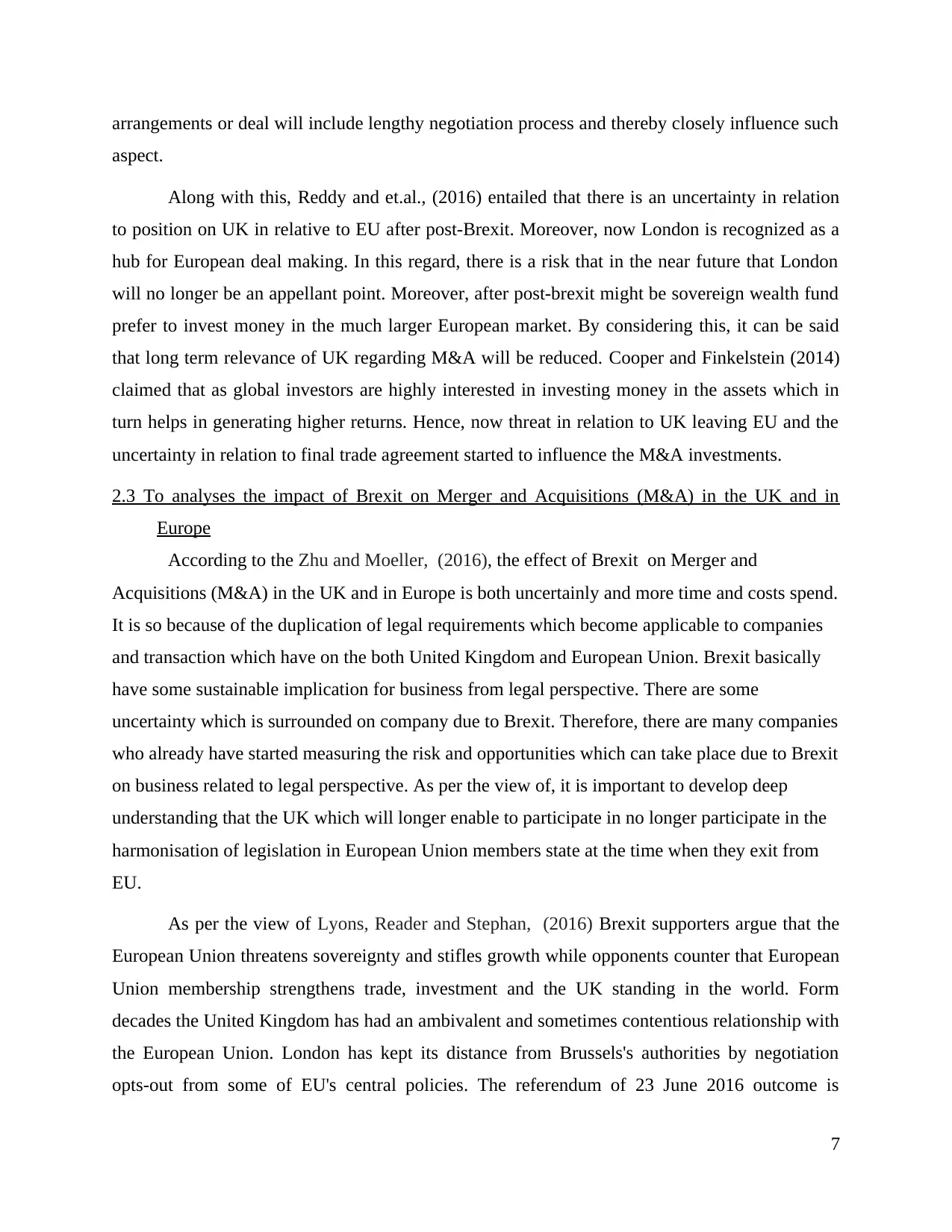
arrangements or deal will include lengthy negotiation process and thereby closely influence such
aspect.
Along with this, Reddy and et.al., (2016) entailed that there is an uncertainty in relation
to position on UK in relative to EU after post-Brexit. Moreover, now London is recognized as a
hub for European deal making. In this regard, there is a risk that in the near future that London
will no longer be an appellant point. Moreover, after post-brexit might be sovereign wealth fund
prefer to invest money in the much larger European market. By considering this, it can be said
that long term relevance of UK regarding M&A will be reduced. Cooper and Finkelstein (2014)
claimed that as global investors are highly interested in investing money in the assets which in
turn helps in generating higher returns. Hence, now threat in relation to UK leaving EU and the
uncertainty in relation to final trade agreement started to influence the M&A investments.
2.3 To analyses the impact of Brexit on Merger and Acquisitions (M&A) in the UK and in
Europe
According to the Zhu and Moeller, (2016), the effect of Brexit on Merger and
Acquisitions (M&A) in the UK and in Europe is both uncertainly and more time and costs spend.
It is so because of the duplication of legal requirements which become applicable to companies
and transaction which have on the both United Kingdom and European Union. Brexit basically
have some sustainable implication for business from legal perspective. There are some
uncertainty which is surrounded on company due to Brexit. Therefore, there are many companies
who already have started measuring the risk and opportunities which can take place due to Brexit
on business related to legal perspective. As per the view of, it is important to develop deep
understanding that the UK which will longer enable to participate in no longer participate in the
harmonisation of legislation in European Union members state at the time when they exit from
EU.
As per the view of Lyons, Reader and Stephan, (2016) Brexit supporters argue that the
European Union threatens sovereignty and stifles growth while opponents counter that European
Union membership strengthens trade, investment and the UK standing in the world. Form
decades the United Kingdom has had an ambivalent and sometimes contentious relationship with
the European Union. London has kept its distance from Brussels's authorities by negotiation
opts-out from some of EU's central policies. The referendum of 23 June 2016 outcome is
7
aspect.
Along with this, Reddy and et.al., (2016) entailed that there is an uncertainty in relation
to position on UK in relative to EU after post-Brexit. Moreover, now London is recognized as a
hub for European deal making. In this regard, there is a risk that in the near future that London
will no longer be an appellant point. Moreover, after post-brexit might be sovereign wealth fund
prefer to invest money in the much larger European market. By considering this, it can be said
that long term relevance of UK regarding M&A will be reduced. Cooper and Finkelstein (2014)
claimed that as global investors are highly interested in investing money in the assets which in
turn helps in generating higher returns. Hence, now threat in relation to UK leaving EU and the
uncertainty in relation to final trade agreement started to influence the M&A investments.
2.3 To analyses the impact of Brexit on Merger and Acquisitions (M&A) in the UK and in
Europe
According to the Zhu and Moeller, (2016), the effect of Brexit on Merger and
Acquisitions (M&A) in the UK and in Europe is both uncertainly and more time and costs spend.
It is so because of the duplication of legal requirements which become applicable to companies
and transaction which have on the both United Kingdom and European Union. Brexit basically
have some sustainable implication for business from legal perspective. There are some
uncertainty which is surrounded on company due to Brexit. Therefore, there are many companies
who already have started measuring the risk and opportunities which can take place due to Brexit
on business related to legal perspective. As per the view of, it is important to develop deep
understanding that the UK which will longer enable to participate in no longer participate in the
harmonisation of legislation in European Union members state at the time when they exit from
EU.
As per the view of Lyons, Reader and Stephan, (2016) Brexit supporters argue that the
European Union threatens sovereignty and stifles growth while opponents counter that European
Union membership strengthens trade, investment and the UK standing in the world. Form
decades the United Kingdom has had an ambivalent and sometimes contentious relationship with
the European Union. London has kept its distance from Brussels's authorities by negotiation
opts-out from some of EU's central policies. The referendum of 23 June 2016 outcome is
7
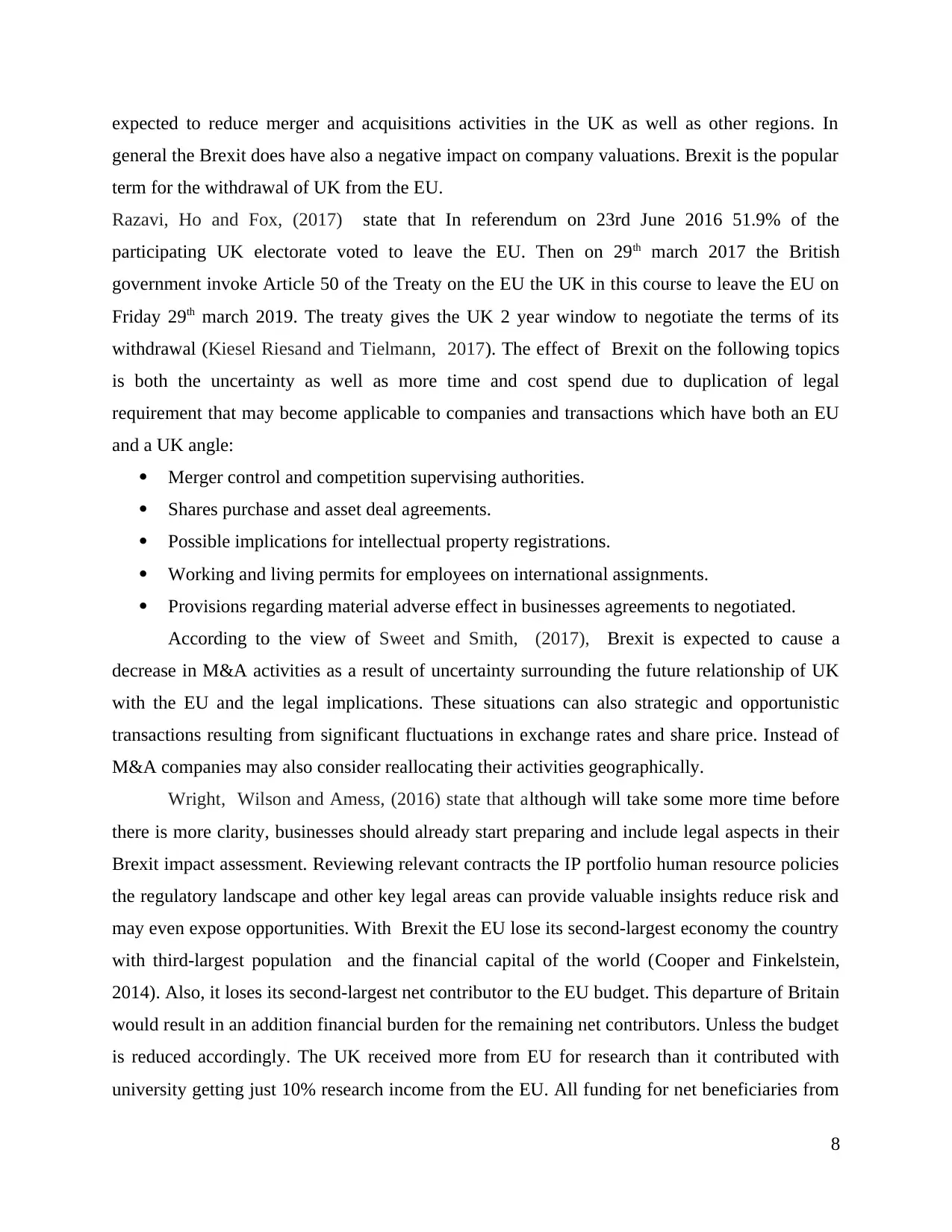
expected to reduce merger and acquisitions activities in the UK as well as other regions. In
general the Brexit does have also a negative impact on company valuations. Brexit is the popular
term for the withdrawal of UK from the EU.
Razavi, Ho and Fox, (2017) state that In referendum on 23rd June 2016 51.9% of the
participating UK electorate voted to leave the EU. Then on 29th march 2017 the British
government invoke Article 50 of the Treaty on the EU the UK in this course to leave the EU on
Friday 29th march 2019. The treaty gives the UK 2 year window to negotiate the terms of its
withdrawal (Kiesel Riesand and Tielmann, 2017). The effect of Brexit on the following topics
is both the uncertainty as well as more time and cost spend due to duplication of legal
requirement that may become applicable to companies and transactions which have both an EU
and a UK angle:
Merger control and competition supervising authorities.
Shares purchase and asset deal agreements.
Possible implications for intellectual property registrations.
Working and living permits for employees on international assignments.
Provisions regarding material adverse effect in businesses agreements to negotiated.
According to the view of Sweet and Smith, (2017), Brexit is expected to cause a
decrease in M&A activities as a result of uncertainty surrounding the future relationship of UK
with the EU and the legal implications. These situations can also strategic and opportunistic
transactions resulting from significant fluctuations in exchange rates and share price. Instead of
M&A companies may also consider reallocating their activities geographically.
Wright, Wilson and Amess, (2016) state that although will take some more time before
there is more clarity, businesses should already start preparing and include legal aspects in their
Brexit impact assessment. Reviewing relevant contracts the IP portfolio human resource policies
the regulatory landscape and other key legal areas can provide valuable insights reduce risk and
may even expose opportunities. With Brexit the EU lose its second-largest economy the country
with third-largest population and the financial capital of the world (Cooper and Finkelstein,
2014). Also, it loses its second-largest net contributor to the EU budget. This departure of Britain
would result in an addition financial burden for the remaining net contributors. Unless the budget
is reduced accordingly. The UK received more from EU for research than it contributed with
university getting just 10% research income from the EU. All funding for net beneficiaries from
8
general the Brexit does have also a negative impact on company valuations. Brexit is the popular
term for the withdrawal of UK from the EU.
Razavi, Ho and Fox, (2017) state that In referendum on 23rd June 2016 51.9% of the
participating UK electorate voted to leave the EU. Then on 29th march 2017 the British
government invoke Article 50 of the Treaty on the EU the UK in this course to leave the EU on
Friday 29th march 2019. The treaty gives the UK 2 year window to negotiate the terms of its
withdrawal (Kiesel Riesand and Tielmann, 2017). The effect of Brexit on the following topics
is both the uncertainty as well as more time and cost spend due to duplication of legal
requirement that may become applicable to companies and transactions which have both an EU
and a UK angle:
Merger control and competition supervising authorities.
Shares purchase and asset deal agreements.
Possible implications for intellectual property registrations.
Working and living permits for employees on international assignments.
Provisions regarding material adverse effect in businesses agreements to negotiated.
According to the view of Sweet and Smith, (2017), Brexit is expected to cause a
decrease in M&A activities as a result of uncertainty surrounding the future relationship of UK
with the EU and the legal implications. These situations can also strategic and opportunistic
transactions resulting from significant fluctuations in exchange rates and share price. Instead of
M&A companies may also consider reallocating their activities geographically.
Wright, Wilson and Amess, (2016) state that although will take some more time before
there is more clarity, businesses should already start preparing and include legal aspects in their
Brexit impact assessment. Reviewing relevant contracts the IP portfolio human resource policies
the regulatory landscape and other key legal areas can provide valuable insights reduce risk and
may even expose opportunities. With Brexit the EU lose its second-largest economy the country
with third-largest population and the financial capital of the world (Cooper and Finkelstein,
2014). Also, it loses its second-largest net contributor to the EU budget. This departure of Britain
would result in an addition financial burden for the remaining net contributors. Unless the budget
is reduced accordingly. The UK received more from EU for research than it contributed with
university getting just 10% research income from the EU. All funding for net beneficiaries from
8
⊘ This is a preview!⊘
Do you want full access?
Subscribe today to unlock all pages.

Trusted by 1+ million students worldwide
1 out of 29
Related Documents
Your All-in-One AI-Powered Toolkit for Academic Success.
+13062052269
info@desklib.com
Available 24*7 on WhatsApp / Email
![[object Object]](/_next/static/media/star-bottom.7253800d.svg)
Unlock your academic potential
Copyright © 2020–2026 A2Z Services. All Rights Reserved. Developed and managed by ZUCOL.





